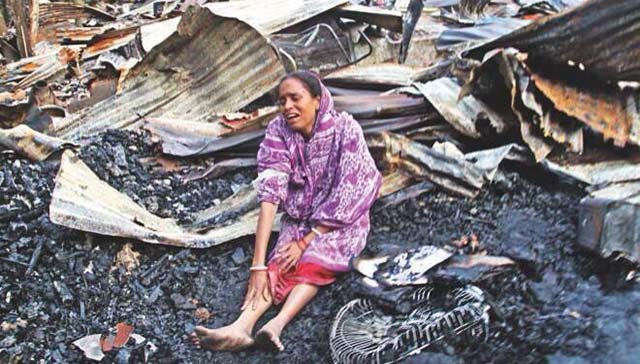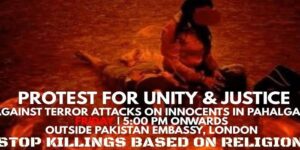On April 30, 2015, the United States joined with the Taliban and other South Asian jihadis by supporting the ethnic cleansing of Hindus in Bangladesh. On that date, the United States Commission on International Religious Freedom (USCIRF) issued its annual report that deliberately ignored the evidence it had about the ongoing atrocities against Bangladeshi Hindus and the current government’s complicity in it.
Since Bangladesh’s independence in 1971, Hindus have gone from almost a fifth of the population to an estimated one in 15 in this country, which has world’s eighth largest population and fourth largest Muslim population. Throughout that time, Hindus have faced ongoing atrocities including murder, rape, child abduction, forced conversion, religious desecration, and pogroms. Through a racist law taken in whole cloth from Pakistan, the Vested Property Act, successive Bangladeshi governments have plundered Hindu property and seized most of it.
The atrocities themselves are horrible enough to cause outrage in all decent human beings and spur them to take action. It’s the Bangladeshi government’s complicity, however, that demanded a stern rebuke from USCIRF and recommendations for US action.
Instead, the Commission did not even place Bangladesh on what it used to call its “Watch List” of nations that do not take action when religious freedom is threatened. A product of the International Religious Freedom Act, USCIRF was passed during the administration of US President Bill Clinton. Its specific mandate involved identifying situations like this and recommending US government action so that we are not complicit in them. Its recent action not only failed to meet its mandate; it also consigned 12 million Bangladeshi Hindus to a terrible fate.
For the past eight years, I have been going to South Asia, comforting victims and confronting victimizers. Had USCIRF acted courageously instead of cowardly, it would have made a difference. The Bangladeshi economy is inordinately dependent on its imports from the US and other western nations, and the powers in Bangladesh will react if any of those states take a strong stand on an issue. I’ve seen it happen before, I’ve been part of it. Bangladesh took action when those nations started objecting to the terrible and dangerous conditions for workers there.
Unfortunately, those same western elites including USCIRF consistently give Bangladesh’s government a pass when it comes to Hindus. Their position in part comes from their naïve belief that the ruling Awami League of Sheikh Hasina Wajed is different from its out-of-power rival, the Bangladesh Nationalist Party, and they will do anything to support the Awami League’s ongoing false claim of being “moderate.” Yet, under their watch jihad against the dwindling non-Muslim population has intensified.
- I personally confirmed unpunished anti-Hindu atrocities at a rate of about one per week under the Awami League rule;
- Bangladeshi human rights activist Rabindra Ghosh and his Bangladesh Minority Watch investigate atrocities and fight government inaction. They face regular attacks either by the government or by those supported by it;
- The Hindu American Foundation and others have documented the anti-Hindu
- Hague based Global Human Rights Defence’s 2013 film, “Culture of Impunity: The rise of Bangladeshi religious extremism,” documented how government inaction enables anti-Hindu atrocities and the rise of Islamists.
The US Congress has begun voicing concern about Bangladesh’s war on Hindus. Bob Dold of suburban Chicago has now been joined by Foreign Affairs Chairman Ed Royce and the only Hindu member of the Congress, Tulsi Gabbard. I also have been working with several Senators through their staff, including Presidential candidate Marco Rubio.
Yet, USCIRF continues down a discredited and deadly path. It had an opportunity to take a moral stance against jihad and instead took the route of silence.
At one point, it looked like things would be different. Chairwoman Katrina Lantos Swett assured me that USCIRF would address the issue. Its representatives reached out to me for contacts inside Bangladesh who could substantiate the ethnic cleansing of Hindus and the government complicity. I connected them with Rabindra Ghosh, who met with a USCIRF staff person in Bangladesh and gave compelling evidence of the atrocities and the Awami League’s complicity. He knew that the government would target him for doing so but told me it was worth the risk.
Yet, USCIRF is more invested with vilifying India than the truth when it comes to Hindus. Their report said precious little about the terrible atrocities against Hindus. In its report on Pakistan, for instance, where Hindus continue to face ethnic cleansing and have been reduced to one percent of the population, USCIRF calls violence against Hindus “allegations,” while it did not similarly question the claims of any other minority group. In 2014, I arranged a meeting between Dr. Swett and Indian officials where we agreed on a path of dialogue that gives equal respect to the US and India. Months later, however, Swett rejected that course telling me she would take another. That choice was clear in the report, which used questionable material to claim religious freedom abuses in India. When USCIRF staff brought the allegations to me for my advice, I provided evidence refuting it. Despite that evidence, USCIRF continued its diatribe and attributed the alleged problems to Prime Minister Narendra Modi’s election and “Hindu nationalist groups.” It also called forced conversion of Hindus “media propaganda.”
Why USCIRF chose this anti-Hindu, anti-India approach is something for which they must answer, because if they cannot be of any value in stopping Bangladesh’s war on Hindus, what value do they have at all?
As a patriotic American, I have to challenge my government and ask how, if we cannot stand up to a rump state like Bangladesh, we will confront countries like Iran and North Korea? And what does all of that say about our new role in the world?
Dr. Richard L. Benkin is an American human rights activist whose current mission is to stop the war on Hindus in Bangladesh.
































